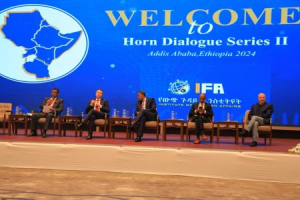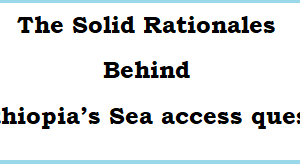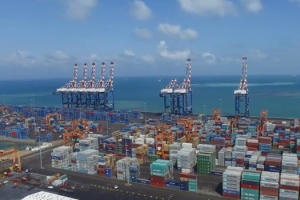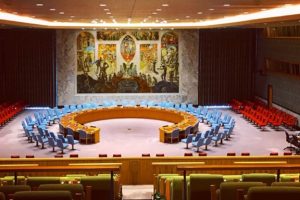
BY EYUEL KIFLU
The Intergovernmental Authority on Development (IGAD) has been playing an important role in promoting and strengthening peace, stability, and economic development across the East African region. The organization is responsible for a wide range of activities that have enabled it to adopt a comprehensive approach to addressing the main challenges faced by the region. These activities include conflict prevention and resolution, protection of human rights, and promotion of good governance.
The organization plays a crucial role in promoting peace, security, and stability throughout its member states. It does this by implementing policies that promote good governance, respect for human rights, and ensuring that the rule of law prevails. With its continued efforts, the organizition is committed to maintaining and enhancing the well-being of the people living within its member states. IGAD is a regional organization that serves a significant role in the economic and political development of Africa. The organization recognizes the importance of regional collaboration and incorporates different member states from various regions, including the Horn of Africa, Nile Valley, and African Great Lakes. These regions face common socio-economic challenges, such as poverty, inadequate infrastructure, and insecurity, among others.
As a matter of fact, the organization has made significant strides in tackling a variety of regional issues that have plagued East Africa. These issues typically include conflict, poverty, and humanitarian crises, among others. What’s more, IGAD tirelessly works towards promoting peace, stability, and economic development across the region. It has achieved several impressive milestones, but it still faces numerous challenges and setbacks.
The organization strongly emphasizes the importance of working collaboratively with its member states, as well as regional organizations and international partners. Through such collaborations, IGAD aims to fulfill its mandate of promoting peace, stability, and economic development throughout East Africa. The organization recognizes that the region faces a multitude of challenges, including conflicts, poverty, and underdevelopment, and thus seeks to address these issues through close partnership with various stakeholders.
Despite being selected from different regions, the member states of IGAD share many common goals and objectives. By sharing resources, experiences, and expertise, the organization works towards providing equal opportunities for all the people living within its member states. One of the crucial roles IGAD plays is in coordinating and harmonizing policies amongst its member states. This collaboration helps to identify common problems and effectively address them through collective action.
With its focus on regional collaboration, policy coordination, and promotion of peace and stability, IGAD plays an essential role in addressing some of the most pressing socio-economic challenges facing the region. It also plays a crucial role in fostering collaboration among member states and serves as a platform for sharing knowledge, resources, and best practices. The primary goal of IGAD is to promote peace, security, and socio-economic development in the region through collaboration and partnership among its member states. This is achieved through various initiatives and programs that aim to address the region’s challenges, such as conflict, poverty, and underdevelopment. The organization works closely with its member states to create and implement policies and strategies that foster cooperation, build resilience, and promote sustainable development.
As a foremost regional organisation, IGAD partners with key stakeholders, including development partners and regional entities to address regional challenges holistically. Through collaborative efforts, the organization promotes initiatives aimed at enhancing socio-economic development in the region. As a regional organization, IGAD recognizes that addressing regional challenges requires cooperation and collaboration among its member states. Hence, IGAD continues to work closely with its member states, other regional organizations, and international partners to deliver on its mandate and promote peace, stability, and economic development across East Africa.
Despite challenges, the organization remains an active player in the region, and the leadership continues to make positive contributions towards the development of East Africa. The organization is always working to overcome the obstacles it encounters and striving to achieve its goals. Through persistent efforts, the organization hopes to continue being an essential player in East Africa and improve the lives of millions of people living in the region.
Through these efforts, IGAD is working towards creating a safer and more secure environment for all those who live within the region, as well as fostering positive relationships between neighboring countries. In the same way, IGAD is not only concerned with political stability in the region but also with encouraging economic growth and environmental sustainability. It achieves this objective by playing an integral role in advancing trade and investment amongst member states. Essentially, IGAD serves as a platform for different countries to engage in beneficial activities that can help boost their economies.
The mandate of IGAD was initially created to address a specific set of issues. Over the years, the organization has expanded its range of concerns to include matters that are critical for the region’s development. Such matters include peace and security, governance, and economic cooperation. By broadening its focus to cover these issues, the organization has evolved into a multi-dimensional organization with the capability to tackle various regional challenges.
Besides promoting trade, it also takes steps towards promoting infrastructure development. By doing so, the organization facilitates the creation of essential structures that are necessary for economic development. The organization plays a crucial role in assisting its member states to overcome common obstacles that affect the region. It also collaborates with its member states to address various challenges, including socio-economic development and regional integration.
Approached by The Ethiopian Herald, Ethiopian Civil Service University School of Law Dean, Tesfaye Abate (LLD), has pointed out that there are several obstacles that hinder the success of the Intergovernmental Authority on Development (IGAD) and its ability to operate effectively. These hurdles stem mostly from political and social factors. The primary factor that affects IGAD’s effectiveness is the will of member states, which entails political commitment and eagerness from governments to promote IGAD as an organization.
He went on saying despite the fact that many political leaders and governments have issued cooperation protocols their implementation has frequently been inadequate. To effectively support regionalism, it is important to establish a complete and responsible political structure. However, political instability poses a significant obstacle in several African countries. The absence of a stable political framework is particularly problematic for IGAD member states. For example, the political system in Khartoum may vary significantly from that of Nairobi.
IGAD faces a major obstacle in the form of conflict, which hinders economic development and trade within the area. Although the organization has passed multiple declarations and protocols, their execution lacks effectiveness. It is imperative to tackle the problem of peace and conflict to enhance prosperity and stability in the region. In addition, enhancing the political climate of each member nation is crucial. By advocating for democracy, peace and security throughout the region, it is possible to improve the overall situation.
“The organization faces several structural challenges, including the management of relationships among member states, which is complicated by conflicts and intense competition. In addition, the lack of strong institutions to coordinate the production and marketing of goods worsens this situation. Moreover, the overlapping membership, as illustrated by Kenya and Uganda’s involvement in both IGAD and the East African Community (EAC), established in 1967, also creates a problem for IGAD.” The dean shared his thoughts on the complications that arise between member states, and how they affect IGAD’s ability to make progress towards its goals. He explained that such conflicts not only hinder IGAD’s attempts to promote cooperation but also discourage governments from pursuing regional integration.
He emphasized the significance of enhancing IGAD’s ability to deal with regional issues by improving its institutional capacity and resources. This can be achieved by member nations addressing the primary factors that impede IGAD’s progress while also prioritizing their own economic growth. As each member state concentrates on its economic development, other advancements will automatically follow. Thus, mutual advancement should be a common objective among the member nations.
He elucidated that despite its achievements in advancing peace, security, and economic growth in East Africa, IGAD has faced various challenges, including political and social factors, internal conflicts among member states, and limited institutional capacity. To address the pressing issue of migration, IGAD member states need to work together and prioritize mutual development by strengthening political culture and implementing IGAD decisions.
“Strong political leadership and cohesive strategies are crucial for addressing regional challenges and ensuring sustainable development, which are necessary for the organization to overcome its current obstacles and become a powerful force for positive change in the region,” he wrapped it up.
THE ETHIOPIAN HERALD SATURDAY 3 JUNE 2023





